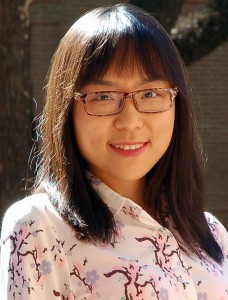 Soon after she arrived as a first year CS PhD student at Rice, Yaxuan (pronounced “yah-shwin”) Wang flew to a Scholars’ retreat at the Google Hyderabad Office as a recipient of the Google Anita Borg Memorial Scholarship: Asia Pacific. The retreat focused on professional development and community networking for graduate and undergraduate students from countries like Australia, China, India, and Japan.
Soon after she arrived as a first year CS PhD student at Rice, Yaxuan (pronounced “yah-shwin”) Wang flew to a Scholars’ retreat at the Google Hyderabad Office as a recipient of the Google Anita Borg Memorial Scholarship: Asia Pacific. The retreat focused on professional development and community networking for graduate and undergraduate students from countries like Australia, China, India, and Japan.
Wang said, “Google finds scholars from all over the world, and provides a platform to us to meet and talk with each other. As we network, we all learn more about each other’s projects and efforts across many fields.”
She felt honored to be named one of the scholars. “It’s very meaningful for me to be included in the group. There must be a reason each one was selected, and they are all brilliant. I was happy to meet them and share ideas and stories.”
In addition to networking, the scholars attended several tech talks on topics ranging from Google contributions to AI research and inventions like self-driving cars. But the talk that most moved Wang was Google’s presentation on reaching their next billion users.
“This talk impressed me a lot and inspired me to focus on research that would contribute to their efforts,” said Wang. “Google has a lot of users, but they have the capacity to handle even more so they are putting in a lot of effort to reach that goal, including the use of cutting edge research and improving their infrastructure.”
During the tech talk, the project leader from Google talked about his team’s three primary challenges. Wang said, “The first two challenges are linked to mobile devices and bandwidth. The presenter said, ‘Most people use phones to access the Internet, but phones has limited space and access to internet in different areas.’ Particularly in undeveloped areas, they cannot get through to the internet or their access is limited. The third challenge was how to provide local content for users in different cultures.”
As the project leader described the ways his team plans to meet their challenges, Wang grew even more interested. “The Next Billion Users team plans to develop more offline services that do not require much space or memory, create bandwidth-friendly services, and explore more ways to leverage existing services into unknown territories,” she said. “Talks like this one broadened my horizons, increased my motivation, gave me a reason to make my own contributions to this amazing and cutting edge research. As I am researching, I will be thinking, ‘I am helping people make the whole world better.’”
Wang applied to Rice’s CS PhD program because it gave her a unique opportunity to explore research areas for up to a year before choosing her focus and advisor. “Currently, I’m interested in techniques of data mining and presenting data. Two years ago, I went to UCLA as an exchange student and realized the massive power and importance of the data underlying social networks. How can we possess that data and get the information we want out of it?”
After she returned to China, she joined a research center in her university and began to work on many projects. She said, “Data from all fields is important, I realized, not just social media. Some data collections are very hard to mine and present. We should continue exploring them and working on more techniques to extract and display the data.”
Wang recognizes the importance of finding a focus that will intrigue her for years. “Six years for a PhD is long,” she said, “so you need something you can pursue with passion to keep you going.”
Her dream is to become a bridge between industry and academia. “Not just learn to do cutting edge research,” she said, “but how to use research to solve some practical problems from the industry and in ways that make the world a better place. If there are data sets we haven’t been able to explore but I can write an algorithm that gives us access to it, then that is my goal for my PhD.”
Yaxuan Wang’s first Rice CS courses were completed as a first-year graduate student in 2016. Her adviser is Luay Nakhleh.